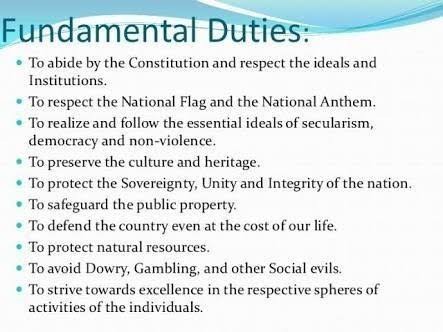[ad_1]
GS Paper 2:
Topics Covered: Indian Constitution.
Context:
The Attorney General for India KK Venugopal has objected to a writ petition which has been filed seeking directions to enforce fundamental duties and steps to sensitise the citizens about their duties.
Background:
In February 2022, a petition was filed in the Supreme Court seeking the enforcement of Fundamental Duties under the Indian constitution through comprehensive and well-defined laws.
- The petitioners argued that the need to enforce fundamental duties arises due to a new illegal trend of protest by protestors in the garb of freedom of speech and expression, by way of blocking of road and rail routes in order to compel the government to meet their demands.
- This is also necessary to remind citizens that fundamental duties were as important as fundamental rights under the Constitution.
Efforts by the Centre to create awareness about FDs:
- Tremendous amount of work has been done for the purpose of sensitising people, both citizens and the students, about Article 51A.
- The curriculum of the schools contains the entire 51A with duties to be taught to them, debates have been held throughout the country, etc.
- The leaders have addressed this aspect- the President, the Prime Minister- from time to time.
- One-year awareness drive has also been launched.
Supreme Court’s judgment in the Ranganath Mishra case – 2003:
The Court observed that fundamental duties should not only be enforced by legal sanctions but also by social sanctions. After all, rights and duties were co-relative.
Directions were issued to the Centre to consider and take appropriate steps expeditiously for the implementation of the recommendations of Justice J. S. Verma Committee’s report on the operationalisation of fundamental duties.
Rationale behind the demand:
- The petition referred to the Bhagwad Gita on the importance of duty. Lord Krishna guides Arjuna and educates him with the importance of duties in all spheres/ stages of one’s life.
- It also referred to the erstwhile Soviet Constitution where the rights and duties were placed in the same footing.
- Fundamental duties instill a “profound sense of social responsibility towards the nation”. Hence, they have to be enforced.
Impacts:
- Enforcement of Fundamental Duties upholds and protects sovereignty, unity and integrity of India.
- It also prepares citizens to defend the country and render national service when called upon to do so.
- It seeks to disseminate a sense of nationalism and to promote the spirit of patriotism to uphold the unity of India after the emergence of China as a superpower.

Fundamental Duties:
Original constitution did not contain any provisions related to Fundamental Duties (FD).
- This section was added through 42nd amendment act to the constitution of India based on the recommendations of Swaran Singh Committee. In 2002, another Fundamental duty was added to this list.
- The idea of this section was borrowed from USSR constitution.
- Japanese constitution is one of the other democratic nations which have a provision dealing with the duties of its citizens.
- Fundamental duties like DPSP are non-justiciable.
Criticism of FD:
- They are made non-justiciable in nature.
- Important duties such as tax-paying, family planning etc are not covered.
- Vague and ambiguous provisions which are difficult to be understood by a common man.
- Superfluous provisions since they would generally be followed even if they were not included.
- Inclusion as an appendage to the constitution reduces the value and intent behind FD.
Insta Curious:
FD apply only to citizens and DO NOT EXTEND TO FOREIGNERS. Which are the other rights applicable to only citizens of the country?
InstaLinks:
Prelims Link:
- Swaran Singh Committee.
- Important Fundamental Duties.
- Fundamental Rights vs Duties.
- Amendments to Fundamental Duties.
Mains Link:
Discuss the need for enforcement of Fundamental Duties.
Sources: the Hindu.
[ad_2]

